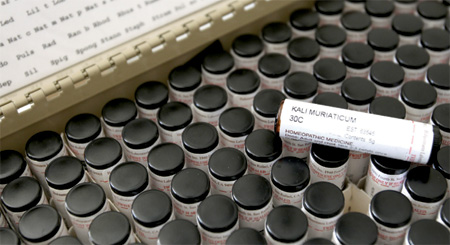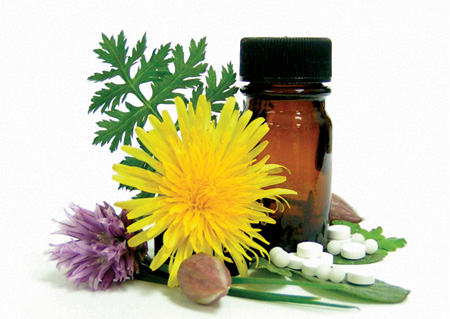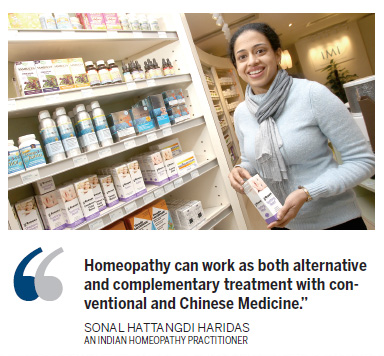Medicine or snake oil
Updated: 2011-01-25 07:08
By Michelle Fei(HK Edition)
|
|||||||||


People who undergo homeopathic treatments swear by them. But the field of homeopathy continues to fight a long uphill battle against a medical establishment which dismisses it as quackery. Michelle Fei reports.
Waiting for the first cry of his new born son was not so pleasurable for Steve Xue, a professor at the University of Hong Kong, especially when the baby was already 48 hours behind schedule.
"That was one of the most dramatic moments in my life," said Xue, recalling his tortuous experience in 2003 when his wife experienced difficulties in giving birth to their second son.
There was no sign of the baby's coming 48 hours after the water broke. It was a rare occurrence.
A friend of Xue's, a homeopathy practitioner, gave some homeopathic remedies to the couple and the baby was delivered half an hour after the remedy was taken.
"Homeopathy impressed me a lot in that case. Along with other clinical evidence I observed during my work, I was completely convinced by the impact of homeopathy," said Xue, who worked in Ohio University in the US teaching Alternative Medicine, including homeopathy.

Homeopathy, first proposed by German physician Samuel Hahnemann in 1796, was a form of alternative medicine in which practitioners use highly diluted remedies.
Homeopathy remedies work according to a principle of "like cures like" or "the Law of Similar" as proposed by Hahnemann - preparations which cause certain symptoms in healthy people are given to patients who have similar symptoms - very similar to the way a vaccine works. The mechanism is to kickstart the immune system with the remedies working as catalysts.
The homeopathic field claims all its remedies are non-toxic and produce no side effect, since they are diluted from natural materials, such as minerals and herbs.
"The most significant attraction of homeopathy is that it is nontoxic. The adverse drug reactions and toxicity of conventional medicine has raised serious concerns among the public," said Xue, noting that in the US alone, some 227,000 people die from clinically induced conditions every year.
In the past 200 years since the birth of homeopathy, the treatment has commonly been used as an alternative to conventional treatment in American and European countries and some Asian countries such as India.
Dilution or deception
Homeopathic remedy is produced by dilution of raw material with alcohol and distilled water. The efficacy of the medicine is believed to be enhanced through vigorous shaking.
The process was also known as "Law of Potentization" as proposed by Hahnemann. He believed that the more times material was diluted, the more powerful the remedy.
The most highly diluted has a dilution factor greater than a drop of water placed in the ocean, according to Fang Zhouzi, a mainland science writer.
"Buying a homeopathic remedy is buying 'water'; taking a homeopathic remedy is drinking expensive water," Fang concluded in his latest article published on China Youth Daily on Jan 5, 2011.
In the UK, homeopathy is controversial despite members of the Royal Family having undergone homeopathic treatment. Homeopathy was judged to be "no more effective than a placebo" by the United Kingdom's House of Commons Science and Technology Committee in its 2010 inquiry into the evidence base for Homeopathy. The Committee urged the government to cease funding homeopathy under the National Health Service; however, the recommendation was rejected by the UK's Department of Health last year.
Besides dilution, another controversial point is the law of "like cures like".
In Germany, the home of homeopathy, a group of young Germans bought a homeopathic remedy for vomiting. Their motivation was to test the assertion of "like cures like". They drank the remedy to see if it would induce vomiting. It didn't work, even after some drank bottles of the stuff.
The undertakers of the experiment concluded, "homeopathy is nothing but a lie", the German magazine Der Spiegel reported on July 12, 2010.
"The so-called 'like cures like' law was a very highly abstracted and easy-to-understand way to illustrate homeopathy; but you can't just take homeopathy in that superficial way," said Sonal Hattangdi Haridas, an Indian homeopathy practitioner at Integrative Medicine Institute Hong Kong. She was in private practice for 12 years at clinics in Mumbai and Bangalore.
Haridas also addressed the placebo allegation, saying many clinical trials have already addressed the efficacy of homeopathy.

Haridas claims expertise in healing children with special needs allergies, uncontrolled epilepsy or concentration issues, and said homeopathy has been central to her success. She adds, there is a large body of evidence in support of homeopathy.
"Can a skin rash go away because of a placebo? Placebos don't exist with babies," said Haridas. The clinic she works in Central has observed a steady increase in the number of patients including people from outside the city.
"Homeopathy can work as both alternative and complementary treatment with conventional and Chinese Medicine," said Haridas. She suggested the public choose well-educated and experienced homeopathic practitioner.
"Any practitioner who asks you to stop your on-going conventional treatment or to use only homeopathy is not trustworthy," said Haridas.
People's medicine
"The crux is that we could not point out the so-called 'effective ingredients' of homeopathic remedy as it works in compound ways, with the combined energy of various elements," Xue said. "This is a fundamental difference between the pharmaceutical approach to developing drugs and the homeopathic way of approving remedies."
Like Traditional Chinese Medicine, which had been practiced for thousands of years, it has failed to convince Western doctors with scientific proof. Xue argues that homeopathy has demonstrated clinical effectiveness.
"After all, it is the result that counts," he emphasized, citing his working experience at Ohio University when he observed that homeopathy worked "beautifully" on patients with spasmodic dysphoria and autism which could not be healed by conventional treatment.
Being one of the few scholars who studies homeopathy in the SAR, Xue has just finished a three-year project translating the "Revised Kent Homeopathic Repertory", one of the "Bibles" of homeopathy. The book will be published on the mainland this year.
"Homeopathy is economical as large quantity of remedies can be produced from very small amounts of raw material. I would call it the 'people's medicine'," said Xue. He said he believed that once the language barrier was conquered, homeopathy will be accepted by both mainland and Hong Kong people gradually.
(HK Edition 01/25/2011 page4)